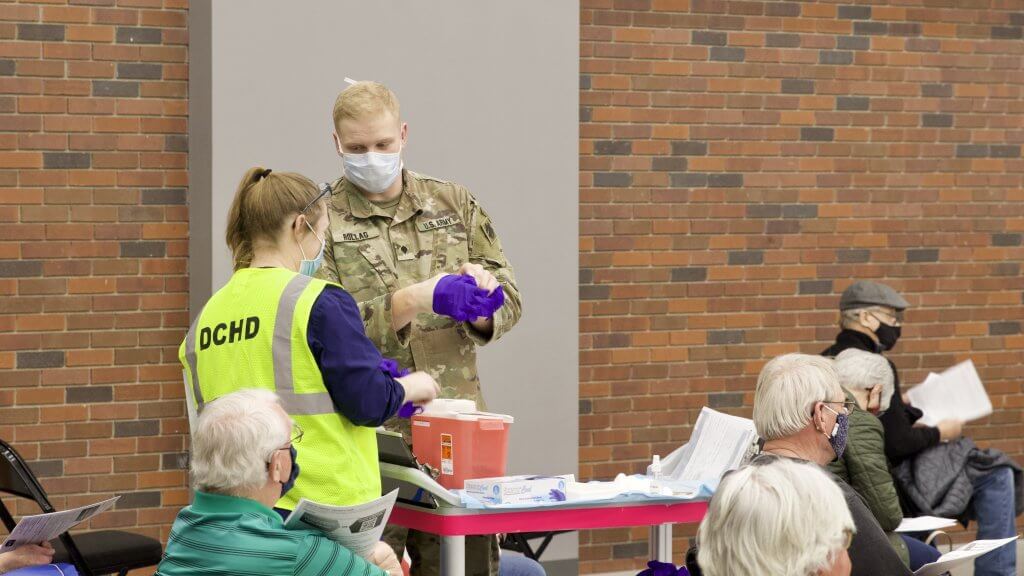The National Guard hit a milestone this month of providing 6 million vaccinations to the civilian population.
The National Guard has been busy on the frontlines of the COVID-19 pandemic since 2020. What started with food deliveries and testing moved into vaccine distribution in communities around the U.S. On April 7, 2021, the combined efforts of 50 states and three territories paid off when the 6 million vaccination mark was reached.
Currently, there are over 31,800 National Guard members on active status, working in their hometowns and helping local communities. Across almost 1,000 vaccination sites in 40 states, shots are administered every single day.
Read more: Guard leaders talk pandemic, readiness, career progression
Last week, the National Guard Bureau hosted a media roundtable to shed light on efforts across individual Guard units.
Maryland National Guard, as an example, has given more than 100,000 vaccinations across the five large vaccination centers and with their mobile teams at smaller locations. In Missouri, Air Force Col. Russell W. Kohl, commander, 131st Medical Group, Missouri National Guard said by their calculations, over 500 lives have been saved directly through the work of the National Guard.
In Nebraska, over 50,000 vaccinations have been administered since the beginning of 2021, but it’s more than the number. Spc. Garrett Rollag, a combat medic with the Nebraska National Guard, has been working on COVID-19 response since April 2020.
“I was initially on a mobile testing team, did that pretty much until about July of 2020, and switched over to the civilian side until about January. Once January rolled around, I got called back up to do vaccinations through the National Guard,” he said.
Rollag has administered over 3,100 shots by himself. Since he’s working in his hometown of Omaha, he’s been able to vaccinate people he knows well.
“Like I saw my high school counselor. I got to give him his vaccinations as well as a bunch of friends that I had in college and high school,” he said.
The people vaccinated by Rollag have been grateful, and sometimes emotional. A few times he’s vaccinated people who have lost a loved one to COVID-19. Other times it’s been older people who are very happy they can visit their family again.
“And this is really, really gratifying to see that reaction,” Rollag said.
Similarly, Staff Sgt. Shavonne Santiago of the Massachusetts National Guard is working on a task force in her hometown. ” Our mission here is basically to assist Brockton Neighborhood Health Community Center and vaccinate as many as many individuals as possible. Hopefully in later days will be able to get the entire community in here to vaccinate,” Santiago said.
Santiago finds that one of the most rewarding parts of this service is that she can interact with and educate her local community. “It’s wonderful we have answers to their questions, we have the ability to give them what they need to protect them, keep them safe, keep their families safe. And again, as well as educate them and instill trust in the community.”
What may be the most memorable for Rollag and Santiago is the personal connection they had with some very special people who received vaccinations. They were both able to personally vaccinate their grandmothers.
“It was it was incredible. And now we can spend time together and share those hugs and all that love without the fear of her potentially contracting the virus and possibly [becoming] deathly ill. So, it was an honor and it was excellent,” Santiago said.
And they’re not done yet. Most states are broadening eligibility and the National Guard is working hard to reach rural and underserved areas that are lacking a strong, local health care infrastructure.
Kohl said, “We’ve been able to move that into underserved populations, particularly in urban St. Louis and urban Kansas City, in order to really make sure that we’re approaching this from a health equity perspective, which is a really strong emphasis from our governor.”
Until then, the National Guard as a whole, and the individuals working in the vaccination centers, will continue to celebrate each dose given.

